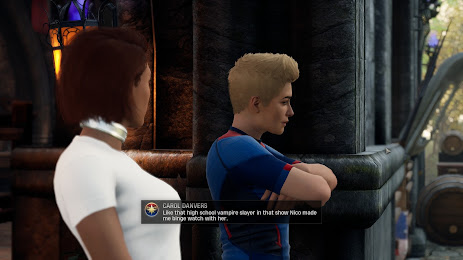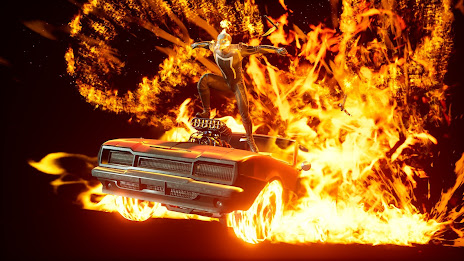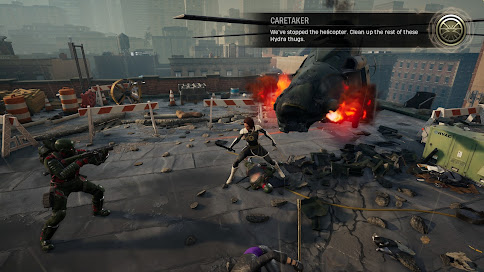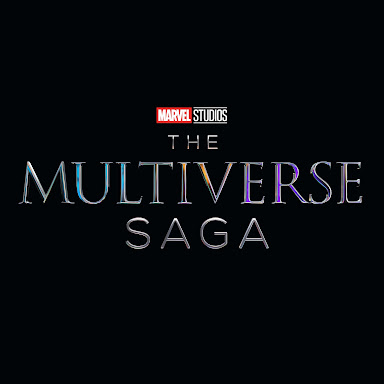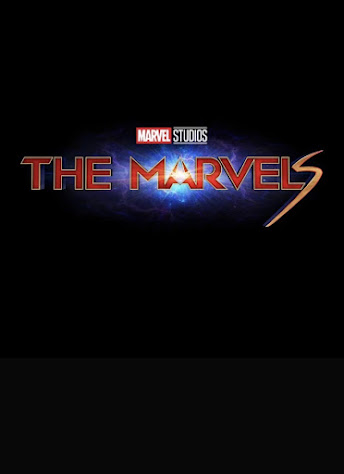Shooter was something of a divisive figure, respected for his practical trouble-solving skills, his recognition of talent, and fighting for better recognition of Marvel Comics within the wider industry (noting a screaming match with one of the people involved in the Transformers animated series who was trying to pass off Shooter's original design document as his own, since he thought nobody would care about the comics people) but derided for his top-down and sometimes micro-management approach to editing. Secret Wars was enormously popular - and is serving as the primary inspiration for the upcoming next two Avengers films - and may have firmly cemented the idea of the "big crossover mega-event" which would go on to dominate the comics industry (for good and ill).
Tuesday, 1 July 2025
RIP Jim Shooter
Shooter was something of a divisive figure, respected for his practical trouble-solving skills, his recognition of talent, and fighting for better recognition of Marvel Comics within the wider industry (noting a screaming match with one of the people involved in the Transformers animated series who was trying to pass off Shooter's original design document as his own, since he thought nobody would care about the comics people) but derided for his top-down and sometimes micro-management approach to editing. Secret Wars was enormously popular - and is serving as the primary inspiration for the upcoming next two Avengers films - and may have firmly cemented the idea of the "big crossover mega-event" which would go on to dominate the comics industry (for good and ill).
Monday, 26 May 2025
RIP Peter David
News has sadly broken of the passing of Star Trek, Babylon 5 and comic book writer Peter David, at the age of 68.
Born in Fort Meade, Maryland in 1956, David became interested in comic books at a young age, through comics left in a local barbershop and TV shows like the Adventures of Superman. David's parents did not approve of his interest in superheroes, especially Marvel, forcing him to read them in secret. David stopped reading comics in his teens feeling he'd outgrown them, but was drawn back in by the Chris Claremont run on X-Men in the 1970s. David also developed a fandom of novels and short stories from reading Harlan Ellison, Arthur Conan Doyle, Stephen King and Edgar Rice Burroughs.
David started his writing career by covering the Washington WorldCon in 1974 for The Philadelphia Bulletin, and then started writing shot fiction in the 1980s which appeared in venues such as Asimov's. He switched to working in publishing, making his way into working for Marvel in the sales department. Switching to editorial was unconventional, but David managed to do it and his first Spider-Man story was published in 1985.
Peter David made his name with his 11-year run on The Incredible Hulk, starting in May 1987 and continuing to August 1998. David's run on the title was acclaimed, with him introducing or popularising many concepts, including the Grey Hulk.
David was keen to keep a toe in the book publishing world and published his first novel, Knight Life, in 1987. David wrote both original series under his own name and the pen-name David Peters, and tie-in fiction. He eventually wrote 101 novels in total, a colossal figure.
Outside of his Marvel association, David was best-known for his work on the Star Trek franchise. In 1988 he started writing the DC Comics Star Trek series (meaning he was working for Marvel and DC simultaneously) and also penned his first Star Trek: The Next Generation novel, Strike Zone, for publication the following year. He eventually wrote 41 issues of Star Trek comics and 48 Star Trek novels.
He was particularly acclaimed for his nailing of the voices of the different Star Trek crews, and his sense of action and humour, as well as paying attention to continuity. His most beloved Trek novels were Strike Zone, Q-in-Law, Imzadi and the Borg epic Vendetta, which a lot of fans believed should have been made into a movie. Some of his later novels were more daft, including at one stage having a Borg "supercube" consumed Pluto "ending the debate once and for all." David was also notable for creating the New Frontier series and penning a remarkable 27 books in the series.
In 1994 David was contacted by J. Michael Straczynski, a fan of his comics work, and invited to work on his television series Babylon 5. David penned the episodes Soul Mates and There All the Honour Lies for Season 2, the former notable for introducing Londo's three wives and the latter for mocking Star Trek's focus on merchandising. The latter episode also sparked a friendly war with Straczynski after he pretended to get annoyed by a teddy bear David's wife bought for him and had the bear blasted into space in the final edit. David, who was friends with B5 actor Bill Mumy, collaborated with him on a TV show called Space Cases, in which the bear is recovered from deep space. David later wrote an episode of the ill-fated Babylon 5 spin-off show, Crusade. He later diversified into video games, working on Shadow Complex and Spider-Man: Edge of Time.
David later returned to the franchise to pen the very well-received Legions of. Fire novel trilogy (which tells the story of the fall of the Centauri Republic after the events of the show) and adaptations of the TV movie In the Beginning and Thirdspace.
Through the 1990s, David worked on other comic series including Aquaman, Supergirl and Young Justice, as well as his own original properties Soulsearchers and Company, and Sachs and Violens. In the 2000s he returned to Marvel to pen Captain Marvel, She-Hulk and Friendly Neighbourhood Spider-Man, as well as working on comics for other franchises including Teenage Mutant Ninja Turtles and Buffy the Vampire Slayer, as well as Marvel's adaptation of Stephen King's The Dark Tower.
David would eventually win a whole slew of awards for his comics work, including a much-coveted Eisner for his Hulk run.
David started suffering from ill health in 2010 when he suffered a herniated disc. In 2012 he suffered a stroke but made almost a full recovery. He was subsequently diagnosed with Type 2 diabetes. In 2022 he suffered an additional series of strokes, a kidney failure and a mild heart attack. These complications contributed to his sad passing away at too young an age.
Peter David was an exceptionally prolific writer, simultaneously juggling multiple comic book series and penning multiple novels a year. What was remarkable was that he combined a prolific output with a strong sense of quality control and sly humour. His Star Trek novels are among the very best ever published for that franchise, his contributions to Babylon 5 may be third only in importance to Straczynski and Larry DiTillio, and he was a noted supported of many charities and good causes. He could be irascible and opinionated, and a lot of his time in the comics field was spent arguing with other writers and creators (including Todd MacFarlane) over various issues.
Peter David's popularity wasn't just down to his work, but also his attitude, constantly giving the impression that he was a massive fan of science fiction, fantasy and superheroes and constantly showing enthusiasm for the field, its writers and its fans. He will be immensely missed.
Sunday, 28 July 2024
Robert Downey Jr., the Russo Brothers and Stephen McFeely to return to the MCU in AVENGERS: DOOMSDAY
Confirming earlier reports, Marvel has successfully lured its most successful directing team, Anthony and Joseph Russo, back to their Cinematic Universe. The two directors will tackle the next two Avengers movies. The first of these has been retitled Avengers: Doomsday and will be released in May 2026, with Avengers: Secret Wars to follow in May 2027. But the Russo Brothers and Kevin Feige also confirmed an old friend will be returning.
Robert Downey Jr., who previously played Tony Stark/Iron Man in nine Marvel movies, is rejoining the MCU as iconic supervillain Dr. Victor von Doom. The announcement was made at the San Diego Comic-Con yesterday.
The role of Dr. Doom, the ruler of Latveria who wants to bring about global order under his rule, was previously played in live action by Joseph Culp in Roger Corman's 1994 movie, Julian McMahon in the 2005 movie and its sequel Rise of the Silver Surfer, and Toby Kebbell in the 2015 film.
The Russo Brothers' longtime writing partner, Stephen McFeely, is also taking over scripting duties on both new films. He previously co-wrote Captain America: The Winter Solder, Captain America: Civil War, Avengers: Infinity War and Avengers: Endgame, the four films previously helmed by the Brothers.
The move represents a near-inevitable pivot by Marvel Studios once actor Jonathan Majors was convicted of misdemeanour assault and harassment in December 2023. Majors had played the villainous Kangs and various alternate timeline versions of the same character in numerous projects leading up to the next Avengers face-off. Marvel had mused recasting, but, given his last appearance in Season 2 of Loki acted as a good pause point for the character, they have instead decided to move to a different story. It may be they return to the Kang storyline with a new actor at a later date, although perhaps they could be forgiven for just writing off the whole thing as a bad idea and moving on.
Speculation will now be rife that Doom - primarily a Fantastic Four villain before appearing with other Marvel characters - may appear or at least cameo in the 1960s-set The Fantastic 4: First Steps (as it was recently retitled), which is due in cinemas on 25 July, 2025 (although the main villain has already been confirmed to be Ralph Ineson's Galactus). It was also confirmed at the Marvel panel that the Fantastic Four will be (similar to Steve Rogers) travelling to the present to fight Dr. Doom in the two new Avengers films.
Given Marvel's recent creative woes, you can't fault them for turning back to their "dream team" to drag them back to the glory days, although some may also feel it's a shame they could not find a firmer footing with new talent to drive them to new levels of success.
Wednesday, 17 July 2024
Marvel tries to lure the Russo Brothers back to the fold
Wednesday, 21 February 2024
Marvel changing plans to recapture the zeitgeist
In an in-depth article for the Hollywood Reporter, it has been revealed that Marvel Studios is pivoting hard as it tries to overcome a series of recent obstacles to recapture the zeitgeist it imperiously commanded for over a decade.
In 2008 Marvel Studios launched the Marvel Cinematic Universe, an interconnected series of superhero films which shared a single continuity, canon and cast of characters, who could pop up in one another's movies and occasionally team up for big "event" pictures. From 2008's Iron Man to 2019's Avengers: Endgame, a mind-boggling run of twenty-two films, the series rarely put a foot wrong. It dominated the box office and the cultural discourse of the time. Even its weakest entries, like Thor: The Dark World or Iron Man 2, remained watchable.
Since 2019, the franchise has faltered. Box office receipts have fallen - The Marvels became the first Marvel movie to definitively lose money at the box office in November 2023 - and critical acclaim has also dropped off sharply. Eleven further films have been released since Endgame and only a few of these - particularly Spider-Man: No Way Home (2021) - have garnered the type of critical and commercial success the franchise once wracked up almost automatically. There has been much discussion over why the franchise has suddenly started faltering so badly, with several problems identified:
- The loss of the franchise's most charismatic and best-written characters and the actors going along with them, most notably Tony Stark/Iron Man (Robert Downey Jr.) and Steve Rogers/Captain America (Chris Evans) in Endgame.
- The failure of most of the succeeding new heroes in making an impression that they can pick up the slack moving forwards.
- An increasingly tiresome inability to break free from the "Marvel format," namely a lot of quips, some action, some moderate character development and then a large setpiece CGI battle at the end, which is rarely outstanding. The few films which did experiment with this, such as Eternals adopting a more serious tone, ended up doing poorly with audiences.
- The conclusion of the mostly straightforward and well-defined Infinity Stones storyline with a well-realised villain (Thanos) and their replacement with the much murkier, more confusing Multiverse storyline and a lower-key villain (Kang) who has not resonated as strongly.
- Simple superhero fatigue: thirty-three films and ten TV series (sixteen, if you include the recently canonised Netflix series) in sixteen years is a lot, not to mention dozens more films and TV shows about superheroes from rivals DC and numerous other studios and streamers.
- An over-expansion into television as part of the streaming wars and then during COVID, bombarding audiences with new shows every few months.
- The increasing feeling that keeping up with the MCU requires having to do "homework," watching shows and films that don't appeal to you because they're going to be referenced in the next Spider-Man movie that you do care about.
- Plans to use the always-popular Spider-Man as a lynchpin for the next generation of movies hit a snag with the Sony/Marvel legal disagreement of a few years ago, which means Marvel can't use Spider-Man as a key character moving forwards when they can lose access to him at almost any time.
- The relatively rapid transition of films from the cinema to Disney+ now means that people can sit out films that look uninteresting or middling until they hit streaming, rather than having to see them in the cinema or risk falling behind the curve.
Marvel has also had to contend with a major problem from one of its tentpole actors for the next slate of films. Actor Jonathan Majors had debuted in the TV series Loki as Kang, a charismatic villain who exists in millions of different incarnations and versions across the Multiverse, a multitude of parallel universes and different timelines. The development of the Multiverse has been a major focus of the films since Endgame and has allowed Marvel to rule that other movie series using their characters - such as the X-Men and Deadpool film series from Fox and the Spider-Man and Amazing Spider-Man films from Sony - exist in the same Multiverse. Kang was supposed to be the lynchpin of this story moving forwards, as different versions of the character appeared in Ant-Man and the Wasp: Quantumania and Loki's second season, setting up a confrontation between Kang and the Avengers in two big movies coming down the pipe.
But in March 2023 Majors was arrested for assaulting his ex-girlfriend, whom he had met on the set of Quantumania. Marvel refused to take any action whilst legal action was ongoing. In December he was found guilty of two misdemeanour counts of assault and harassment. Marvel quickly confirmed they had terminated their relationship with the actor. Despite initial speculation that the character would be recast - previous different versions of characters across the Multiverse had been portrayed by different actors, with three versions of Spider-Man showing up in No Way Home to great success - it now appears that Marvel is moving away from the character and storyline altogether, minimising him in future projects and pivoting to another villain (speculated in other sources to be Doctor Doom) to be the "big bad" in the next two Avengers films coming down the line.
According to the HR article, Marvel are taking a number of further steps to address their issues. The first is a reduction of output: 2024 will see the release of just one Marvel movie, Deadpool and Wolverine, which will introduce the Merc With a Mouth to the Marvel Cinematic Universe and also cement the Multiverse connections between the older X-Men films and the MCU. Only one more TV show is expected this year, Agatha: Darkhold Diaries. 2025 is expected to focus hard on the arrival of Marvel tentpole characters the Fantastic Four in the MCU, with Pedro Pascal, Vanessa Kirby, Ebon Moss-Bachrach and Joseph Quinn recently announced in the starring roles for the film. Marvel is hoping that the integration of the Fantastic Four into the MCU, followed later by new versions of Blade and then the X-Men, will give their franchise new legs as it - improbably - heads towards its third decade of production.
Whether these steps are going to be enough to right the ship remains to be seen, or whether at some point Disney and Marvel will have to accept that the MCU's time has simply run out and it needs to be rested for a few years before the inevitable reboot with new actors playing Iron Man, Thor and Captain America.
Wednesday, 14 February 2024
Marvel casts the Fantastic Four
Wednesday, 10 January 2024
Marvel finally, officially canonises the Netflix Marvel-verse
- Daredevil: Season 1 (2015)
- Jessica Jones: Season 1 (2015)
- Daredevil: Season 2 (2016)
- Luke Cage: Season 1 (2016)
- Iron Fist: Season 1 (2017)
- The Defenders (2017)
- The Punisher: Season 1 (2017)
- Jessica Jones: Season 2 (2018)
- Luke Cage: Season 2 (2018)
- Iron Fist: Season 2 (2018)
- Daredevil: Season 3 (2018)
- The Punisher: Season 2 (2019)
- Jessica Jones: Season 3 (2019)
Saturday, 14 October 2023
Secret Invasion
More than thirty years ago, Skrull refugees on Earth reached a deal with Nick Fury and SHIELD that they would work undercover for the organisation, using their amazing shapeshifting skills, in return for SHIELD's help in locating a new homeworld for them. Unfortunately, some of the Skrulls are unhappy with the length of time it has taken Fury to deliver on his promise, and instigate a new plan: to take Earth as their new home. Fury and his old Skrull friend Talos join forces to defeat the rebels' plan, but find fighting an army of shapeshifters is incredibly hard, even with shapeshifters of their own to help.
Secret Invasion is, in almost all respects, a television series. It is six episodes long, and features sequential events that build to tell a story. If this sounds like a very dull and overly pedantic description, that's because Secret Invasion is possibly the ultimate example of Extruded Franchise Product: something that exists to make money and to keep fans ticking over until the Next Thing in the franchise appears to take their money. It does not dare to innovate, say or do anything interesting. It simply exists, without much in the way of passion or engagement.
Exactly how you make this premise the most boring entry of the Marvel Cinematic Universe to date is a matter for conjecture. You have an outrageously good cast, including Samuel L. Jackson, Ben Mendelsohn, Olivia Coleman, Don Cheadle, Cobie Smulders, Martin Freeman (in a much smaller-than-expected role), Emilia Clarke and a bunch of promising newcomers. The most notable of these is Kingsley Ben-Adir who shows some fire as main antagonist Gravik but is let down by the indifferent writing. Everyone else phones their performances in, apart from Olivia Coleman who is having more fun than everybody else on the show combined, and Don Cheadle, who gets a few great scenes as the sarcastic Skrull-disguised-as-Rhodey. Perhaps a sign that Cheadle should get more villainous roles in the future.
The show also has a remarkable air of topicality: the rebel Skrull plan is to trigger a third world war by undertaking attacks on Russian and NATO soil and getting them to blame one another. In one decidedly bonkers moment, we learn that Russian forces are moving into Ukraine (the show was written and partially filmed before the February 2022 invasion, but completed shooting and post-production afterwards). There is also a lot of commentary on how to handle refugees and deal with displaced populations. However, any potential for the show to speak to our current moment is lost by the writing resolutely steering away from such things, presumably because it just wants to be escapist entertainment (which is a bit hard when the show leans so hard into modern-feeling issues).
Still, you could still have a good show if anybody felt like they were actually invested in this idea. Much has been made of the opening title sequence, which was partially generated by artificial intelligence. I'm surprised there hasn't been more attention paid to if the script was written by artificial intelligence as well. It feels like a greatest hits of Marvel and thriller tropes thrown into a blender and the results fired at a wall to see what sticks, but with almost no passion or excitement about the ideas in play.
The show's biggest mistake is wasting Samuel L. Jackson. Jackson is a fantastic, charismatic performer, but here he is depicted as filled with self-doubt. On one level, it's great that the show allows Jackson's Fury to be human and flawed, and weighed down in the latter part of his life by everything he's done. But that would require an outstanding pedigree of writing and direction to pull off, which is not the case here. Jackson instead often comes across as bored, with flat line deliveries. He sometimes sparks into life, and the show is at its best when he and Mendelsohn are exchanging quips or he and Cheadle are engaged in dramatic face-offs. But these moments are relatively few and far between.
Secret Invasion (**) should be a home run: one of the most popular performers in the MCU in a (relatively) grounded, near-future thriller, packed with interesting and - if inadvertently - topical ideas. Instead it feels tired, bored and out of gas. There are flashes of quality, a few good performances, a couple of solid character scenes, some nice action beats, but these are separated by yawning voids of mediocrity. Easily the weakest MCU TV show to date and a strong claimant to being the weakest instalment of the MCU as a whole.
Saturday, 8 July 2023
Black Panther: Wakanda Forever
Wednesday, 28 December 2022
Midnight Suns
Wednesday, 28 September 2022
Marvel's BLADE loses director just ahead of shooting
In surprising news, Marvel's new take on Blade has lost its director just two months before shooting was due to start.
Bassam Tariq (These Birds Walk, Mogul Mowgli) was hired to direct the film a year ago. The movie had not been on Marvel's radar, but actor Mahershala Ali had contacted them directly to propose starring in the film, which was then put into a fast turnaround. The film was teased with Ali debuting in an off-screen voiceover at the end of Eternals.
Marvel and Tariq have stated the split was amicable, with the reason for the split being changes in Marvel's schedule, suggesting that the filming dates may have shifted or Marvel may be considering a delay that would have clashed with another project the director had lined up. However, officially the movie's production still has a start date of November 2022 and a release date of 3 November, 2023.
Finding another director at such short notice who'll be willing to take over a script and pre-production they had no hand in, is going to be tough.
Sunday, 24 July 2022
Marvel outlines the future of their cinematic universe
- She-Hulk: Attorney at Law - Season 1 (17 August 2022, Disney+)
- Black Panther: Wakanda Forever (11 November 2022, cinemas)
- The Guardians of the Galaxy Holiday Special (December 2022, Disney+)
- Ant-Man and the Wasp: Quantumania (17 February 2023, cinemas)
- Secret Invasion (Spring 2023, Disney+)
- Guardians of the Galaxy - Volume 3 (5 May 2023, cinemas)
- Echo - Season 1 (Summer 2023, Disney+)
- The Marvels (28 July 2023, cinemas)
- Loki - Season 2 (Summer 2023, Disney+)
- Blade (3 November 2023, cinemas)
- Ironheart - Season 1 (Autumn 2023, Disney+)
- Agatha - Coven of Chaos (Winter 2023, Disney+)
- Captain America - New World Order (3 May 2024, cinemas)
- Daredevil - Born Again - Season 1 (Spring 2024, Disney+)
- Thunderbolts (26 July 2024, cinemas)
- Fantastic Four (8 November 2024, cinemas)
- Avengers: The Kang Dynasty (2 May 2025, cinemas)
- Avengers: Secret Wars (7 November 2025, cinemas)















